- Home
- Meg O'Brien
Gathering Lies Page 20
Gathering Lies Read online
Page 20
My father was graying even then, and a bit more stiff about having his picture taken. I could tell this by the way he sat, his back straight, not relaxing on the prickly wooden log. It must have dug into his bare thighs, I thought, smiling. He never really did like wearing shorts, but rather gave in to my mother, who would tease him into it by telling him he had good legs. I often wondered if she just didn’t like having to wash and iron his long pants.
Their names were below the photo—Anne and James Lansing—and beneath that was the date. The photo had been taken around the same time as the one of me at ten.
I wondered what had happened between my mother and father between that time, and the year I was seventeen and my mother was having the affair with Luke’s father. Did she come to feel too alone, with my father returning home from work every night and shutting himself in his study to work? What kind of life could they have had? And how had Luke’s father filled the gaps?
I skimmed through the pictures of other guests, and the ones of Timmy and her husband planting organic vegetables, then posing, with smiles on their faces, in front of the fireplace. Timmy had bunches of wild-flowers in her arms, and wore a bright scarf with an East Indian design.
Poor Timmy, I thought, not for the first time. What a loss she’d suffered—first her husband, then Thornberry. What would she do now?
Finally I came to a snapshot of Luke’s father and mother one night when they’d come to dinner at Thornberry. Timmy had often had neighbors in to meet her bed-and-breakfast guests, giving them a bit of social life on what was then just as isolated an island. Luke’s parents, I knew, had come over more than once.
I stared at the image of Charles Randell Ford, and tried to picture him making love to my mother. He was quite handsome, though in truth, as her daughter, I couldn’t picture anyone making love to my mother—not even my father. Was Luke’s father tender with her? I wondered. Did he talk to her about things that amused her?
He was, I remembered, more attentive than my father. Much like Luke in that way. On those long summer days when I would sit in the background and listen to him and my father talk, Charles Ford would include me now and then. He was already on the bench at that time, and I felt flattered that this well-known and highly respected Seattle judge would think that I, at fourteen, fifteen, might have an opinion worth hearing. But he did, and would even challenge me at times, making me stand up for myself and my opinions. After a while I learned to do this without hesitation, and it was probably Charles Ford who molded me into the lawyer I became, even more so than my father.
I had even thought, briefly, of approaching Judge Ford when I was arrested in January, to see if he could help me in some way. The only reason I hadn’t was that I knew he might possibly end up hearing my case. And if I spoke to him about it beforehand, he might have to recuse himself and turn the case over to someone else.
I didn’t want that to happen. Though I hadn’t talked to Luke’s father on a personal basis in years, I’d gone before him with cases now and then, and I knew him to be a fair judge. Tough, but fair. Having him assigned to hear my case could be a blessing.
I leafed through more photographs, and it struck me suddenly that all four of our parents must have been, at that time, still in their thirties and early forties. Luke’s father was the oldest, I knew, but he couldn’t have been a day over forty-two then, since he was now in his mid-sixties. As for my mother, I had never thought of her as being this young when I was a teenager. Younger than I was now.
Seeing my parents and Luke’s in this way opened up a whole new world of understanding to me.
I closed the photograph album and sat there thinking. Luke’s mother and my father were now gone. Would my mother and his father get together again, the way high school sweethearts sometimes did, after thirty or forty years and other loves had passed?
It was too soon, probably, for my mother to think of that. My father had died only three months ago, and one doesn’t easily get over the loss of a spouse one has lived with for that many years. I had seen my mother in mourning, and I knew that whatever had happened in the past, the loss she felt was real.
It had shocked me when, shortly after my arrest, my mother had abruptly moved to Florida, with little explanation. She needed to get away, she said one night, and would be visiting her sister, my Aunt Rinna. The next morning, she was gone. A messenger brought me the small brown envelope, with only the key to my old home and a note: Feel free to house-sit. Love, Mother.
At first I was too angry and hurt to even consider doing that. I had lost my father, too, and was still in mourning. How could she leave like that? Why couldn’t we have helped each other through our pain?
But then Lonnie Mae was murdered, and I threw myself into her case. I hid the evidence with Angel, and then, to be on the safe side, moved into my parents’ house, which at least had the comfort of a security system.
So my mother had given me that: a safe haven, for a while. And when the invitation to Thornberry had arrived, the island had seemed to me an even safer place to hide out for a month—from the Five, from reporters, from life.
I sighed. Life, unfortunately, has a way of finding one, no matter how far one runs.
Getting up, I brushed plaster dust from my pants and put the album on the low stack of books I’d started. For a moment I considered showing it to Luke, but quickly discarded the idea. Too many memories, too many moments that could never be recaptured. Like the tattered edges of the yellowed photographs, they had seen their day.
Later that afternoon, while I was picking early lettuce in the garden, Angel suddenly came to mind again. I hadn’t heard from J.P. Blakely since the day she sent the Allegra case back to me, and as my hands went into the dark, moist earth, her face seemed to appear before me. Not anything as mystic as an apparition; just a brief, sharp flash of memory.
Angel was one of the best PIs I’d ever met, and in my line of work I’d had occasion to meet a lot of them. When the Allegra case first came back from her with no note attached, I’d assumed she was in a hurry to get somewhere. For whatever reason, she must have thought the evidence would be best off in my hands while she was gone. It could have been a case that had taken her out of town. Or the new boyfriend she’d told me about—the one she’d said she met at McCoy’s one night. Either one of those possibilities made sense to me at first.
But now I wondered, would she have been out of the office that long without any word to me? Calls to her secretary, up until the day I left for Esme, had continued to elicit the information that Angel was “away” and would call me when she returned.
Every night before she’d left town, I’d waited with my cell phone at eight o’clock, J.P.’s usual time to call. Sometimes she’d have new information to report; other times we just talked as friends. Angel was the most supportive person in my life at that time, and I looked forward to talking with her every night. More than anything, I missed Angel as a friend. The nightly calls had become like anchors for me, holding me steady in rough seas. Was she back in Seattle, I wondered, when the quake hit? Was she still alive? Would I ever see her again?
The thought had occurred to me, of course, that the Five had gotten to her somehow. That she’d been hurt—or worse. But I remembered Angel saying to me one night, “Don’t worry if you don’t hear from me now and then. I may have to go out of town for a bit.”
Angel’s secretary was the only person I’d left a forwarding number with when I came to Thornberry. Since we were asked not to bring cell phones here, I had left Thornberry’s office number, with instructions for Angel to call me as soon as possible. She didn’t, though. Not once in the week I’d been here before the quake.
Something was wrong. Every fiber of my being told me that something was terribly wrong. The green leaves of the lettuce crinkled in my palm, bringing me back. I’d been making a fist, bruising my crop. Timmy would have a fit. But there were so many emotions welling up in me, and I wanted more than anything to run into the woods
and scream. Get it all out. All the fears, loss and betrayal, beginning with my arrest in January and leading up to the quake. There had been no real time alone since then to let down, no time when I hadn’t been trying to be strong for everyone else.
It would have been easier without Luke and Gabe here, I thought. I was a competent, independent woman, given to running my own life and solving my own problems. Now, suddenly, I wanted to lean on any man—just point one in my direction. It was stupid, I knew, but the impulse persisted. I wanted to tell Luke, in particular, what had been going on with me, answer all his questions. I wanted to tell him about my evidence against the Seattle Five and about Angel. More than anything, I wanted to solicit his help in finding the Allegra case and keeping it safe. And I wanted him to help me find out who had taken my manuscript and disk.
The fact that I didn’t trust him enough to open myself to him left me feeling more alone than if he’d never shown up.
As for Gabe, what woman here wouldn’t want to fall for his charming ways? What woman wouldn’t like to accept all the help he had to offer, and let herself lean for a while? We had all been through a terrifying, exhausting experience, and none of us was as sure of herself or as confident about life as she had once been.
We were all suffering from that syndrome survivors of earthquakes get: we were hypervigilant, constantly on the lookout for the next danger. The minute the ground would start to shudder again in an aftershock, even the smallest one, we’d leap to our feet and look for the nearest table to crawl under. At night, we found it difficult to sleep. We told ourselves and each other that we had to stay alert in case the quake had only been a foreshock and there was still a bigger one to come.
In short, our nerves were a mess, and the rescuers we had hoped for were only a distant dream. We knew, now, that we might have to survive here—with each other—for several more days. Possibly even weeks.
If there had been any news from the outside, any at all, it might not have been so bad. With only each other to talk to, however, and to toss ideas around with, we tended just to bring each other down. That was another aftereffect of the quake: a deep depression set in. We had passed the initial shock stage and moved into anger. Now, faced with helplessness against the situation, we lost our spirit.
This, more than anything, I think, is what led to the terrible thing we did.
12
As I’ve said, it started with that night of dancing and the emotions that were aroused. The backbiting amongst the other women accelerated as one day passed and then another, with no sign of rescue. Soon they were openly fighting, and it was all I could do to keep them apart.
Why I didn’t end up that way myself, I cannot honestly say. The thought has occurred that I had Ian to thank for it, because I simply wasn’t all that interested in the men. Oh, I had feelings just like the rest. Especially for Luke—and now and again for Gabe, as well. But my intellect had clamped down on those feelings, and I was able to remind myself that I’d been hurt, and all too recently. This was not the time to get involved again. This was the time to be cautious. To protect myself. And somehow, I managed to stick to that.
It didn’t help anyone that there wasn’t much to do after the first few days. Though it was true that fishing, clamming and prying oysters off rocks took up time, that was actually easier and quicker to do than driving to a modern supermarket, filling up a cart, driving home and having to put it all away.
As for laundry, we all learned to wear our clothes a couple of days in a row. When we couldn’t stand ourselves any longer we’d go down to the beach and wash one outfit at a time, hanging it to dry on bushes. When it rained, we brought our clothes inside, hanging them on a line that Luke had strung up in the hallway.
Our earlier plans for beginning to clean up the mess around Thornberry and our cottages soon faded as hunger and weakness became a major part of our days. We did do some work of that nature, but not nearly as much as we’d originally envisioned. Going without the “necessities” of life proved to be more difficult than we had thought, and a lot of that was surely the mind-body connection scientists talk about. Once depression set in, we could no longer talk ourselves into feeling good when we clearly didn’t. We were not on an adventurous camping trip, with a comfortable bed and a full fridge awaiting us at home. We might even—as Grace one evening pointed out—actually die on Esme Island.
It was because of the backbiting and arguing on the other women’s parts that I left the farmhouse on the fifth night and went off in the woods to be alone. Everyone else was in the kitchen, including Luke and Gabe, playing a game that Dana had made up with stones she had gathered from the gravel driveway. Dana, at least, was trying.
But as the players began to fight over who had the most stones and whether someone had cheated, even Dana lost it, jumping to her feet and sweeping all the stones from table to floor. “Will you people, for God’s sake, act like adults?” she yelled.
There was only a moment’s silence before everyone began shouting that she was acting like a three-year-old, and where the hell did she think she got off, knocking all their stones on the floor?
It was at this point that I threw up my hands and excused myself, saying I’d be back in a few minutes. I took a flashlight, and hoped that if anyone noticed they would assume I’d gone out to the latrine. Not that they were likely to miss me, with all that bickering going on.
I wandered along the shore, glad for the full moon and a rain-free sky. The water rippled gently, sometimes reaching the toes of my boots. There had been no sign of a tsunami, for which we’d all been grateful, and the aftershocks had done no more damage since the first few days. At least, none that we were aware of.
I lost track of time, and was surprised when I came to the Ransford dock. Looking up at the house, I was even more startled to see that only a bare shell had been left by the fire. This was the first time I’d been here since that night, and I hadn’t pressed Luke for specifics.
What a terrible shame, I thought. That beautiful house, gone now for all time. I was relatively certain Luke wouldn’t rebuild. Not if he traveled that much. More likely he’d put up a small cabin here, as a weekend getaway for those times when he worked out of Seattle. Luke had always liked the idea of having a getaway, and had at times quoted Thoreau: “Simplify, simplify, simplify.” He had admired Thoreau and the way the author had gone to jail rather than pay taxes to a country that, as Thoreau saw it, was committing a holocaust on its own ground against the Native Americans. Luke had pictured himself in a small cabin one day, not the luxurious kind of home his parents had always had. His cabin, he had said, would have just enough room to read and contemplate.
I’d always been intrigued by men who set up lifestyles of this sort that didn’t include a woman in them, and then wondered why they didn’t have a woman.
I took the path up to the house and stood on the edge of the fire’s rubble, trying to picture Jane here, setting that fire. I tried to feel her desperation at wanting to be rescued, at being reunited with her children.
Nothing would come. I hadn’t known Jane well enough, and I didn’t know her children or husband at all. I didn’t even know what it felt like to be afraid for a child. There had never been one in my life.
I did have a dog when I was ten. She was part Bichon Frise, white and fluffy. Her name had been Tufts, because of the way her hair stood up on end by her ears. Tufts had been my constant companion for at least a year, and had lived up to the promise of the woman who had raised her; she was affectionate and fun. Tufts, in fact, gave out more affection than I’d had from either of my parents, though they did their best. They did try.
Tufts got out of the house one day and was struck by a car. I remembered kneeling over her, seeing the extent of her injuries, which were many. I listened to her strangled breaths and knew she could last only another minute or two. I couldn’t bear the pain she must have been feeling, and I leaned close to her ear and whispered, “Let go, Tufts. Just let go.”
>
As if she knew what I was saying, Tufts died in my arms, and that was my first lesson about death. When it was inevitable, the only thing left was to let go. That was true for the dying and the one who survived, as well, and I had done my best. There were still moments, however, when I longed for another dog in my life. Just as there were moments when I longed for another man.
I don’t know what made me go around the Ransford house and into the woods, in the direction Luke had gone that night of the fire. I found a path there, however, at the edge of the back lawn. It was nearly hidden by two huge boulders and a thick stand of shrubbery. Curious, I followed it for no reason other than to see where it led, and to keep walking—to clear the cobwebs from my brain.
The path was narrow, with twists and turns. It led into a part of the forest I’d never explored, and the trees kept getting thicker, the night darker where the moon couldn’t get through to guide my way. I used my flashlight to see where I was stepping, as the path was overgrown. There were gnarled tree roots poking out of the ground, and old dead tree stumps appeared right in the middle of the path. Even with the flash-light it was an obstacle course, and I had to be careful not to trip and fall. This was becoming more like work and less like fun, and I considered turning around and going back the way I’d come. Just a few more yards, I told myself. Let’s see what lies ahead.
I’d been on the path for perhaps ten minutes when the sound of snapping twigs came from behind me. Several times I turned around to look. Had someone followed me over from Thornberry? Were they looking for me, after all?
I pointed the beam of my flashlight back down the path, but could see no one.
“Hello?” I called out. “Who’s there?”
No answer.
Was I hearing only deer, perhaps, startled by my presence? They must have run into places like this to hide after the quake, areas most people didn’t inhabit.

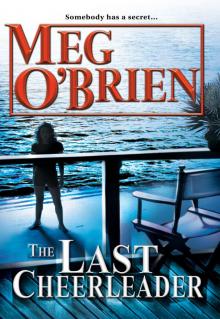 The Last Cheerleader
The Last Cheerleader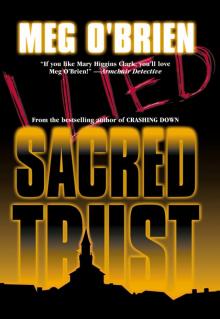 Sacred Trust
Sacred Trust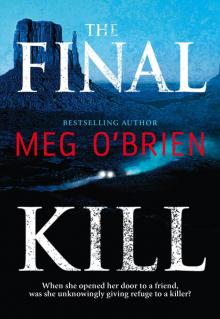 The Final Kill
The Final Kill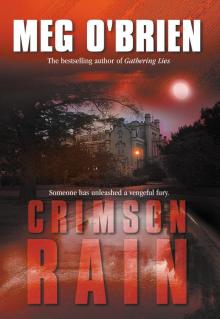 Crimson Rain
Crimson Rain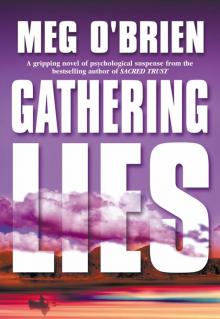 Gathering Lies
Gathering Lies